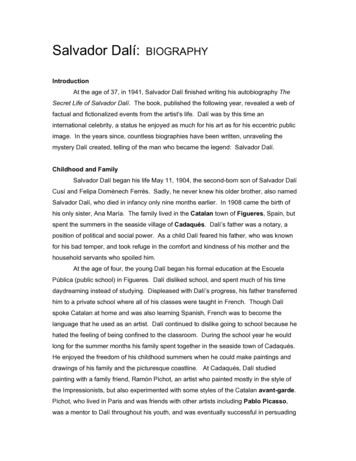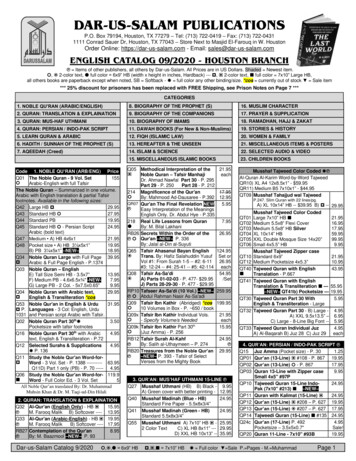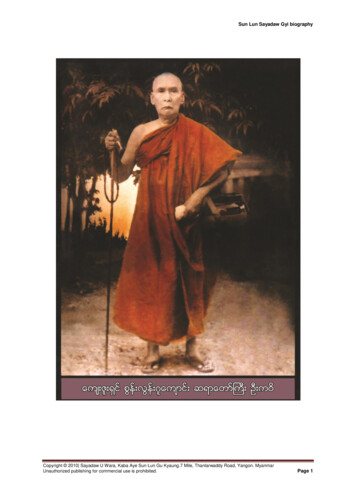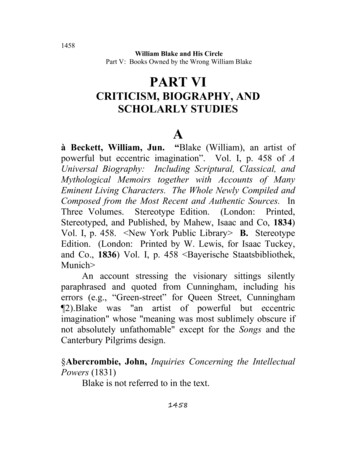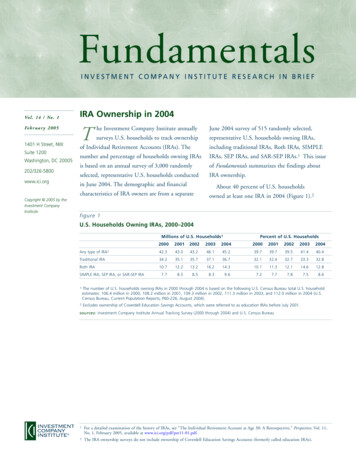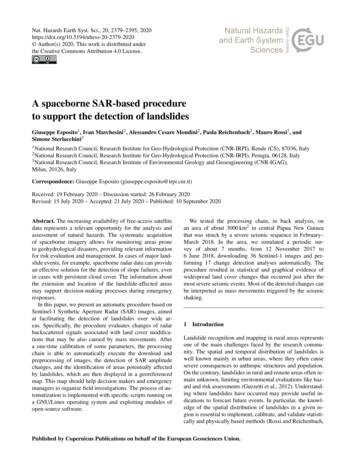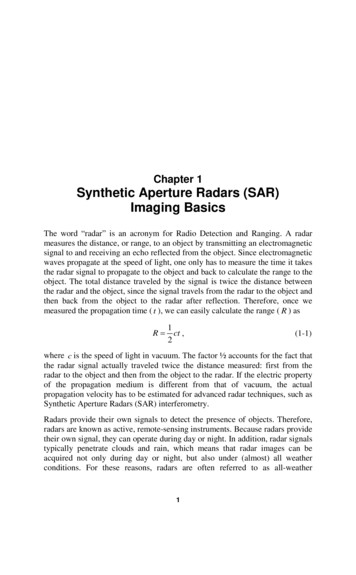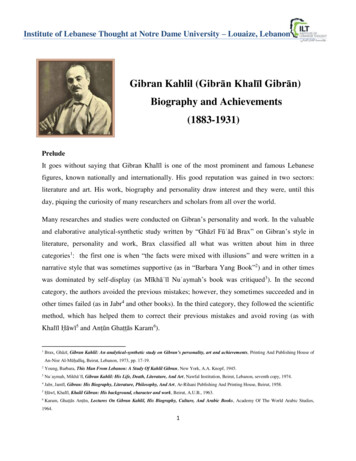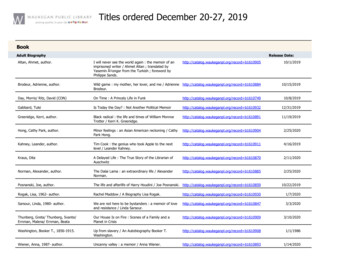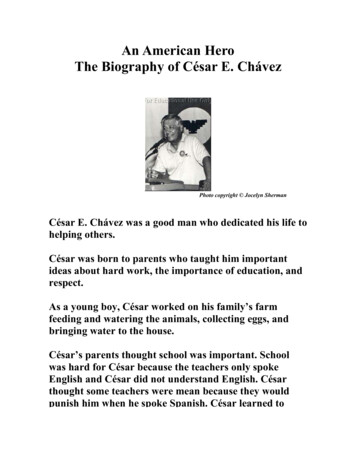
Transcription
An American HeroThe Biography of César E. ChávezPhoto copyright Jocelyn ShermanCésar E. Chávez was a good man who dedicated his life tohelping others.César was born to parents who taught him importantideas about hard work, the importance of education, andrespect.As a young boy, César worked on his family’s farmfeeding and watering the animals, collecting eggs, andbringing water to the house.César’s parents thought school was important. Schoolwas hard for César because the teachers only spokeEnglish and César did not understand English. Césarthought some teachers were mean because they wouldpunish him when he spoke Spanish. César learned to
read English in school and he learned to read Spanishfrom his uncles.César’s parents were very strict and taught him and hissisters and brothers to show respect to others.His parents also taught him that it was important to helpothers. César and his family often helped his uncles,aunts, and cousins by giving them food when they hadlittle to eat.Photo Courtesy of César E. Chávez FoundationCésar and his sister are standing outside their home.
Photo Courtesy of César E. Chávez FoundationCésar and his sister are dressed for their First Holy Communion.César’s grandmother, Mama Tella, taught him about theimportance of their religious faith and to have a strongbelief in God. When César grew up, he would rememberand practice what his grandmother had taught him. ForCésar, religion was a most beautiful thing.
Photo Copyright Manuel EchavariaIn 1975, this farm worker family is eating lunch along sidethe fields in the Santa Maria Valley in the shade of theirvan because there is no other shade available.When César was ten years old, his family’s home wastaken away from them because they did not have enoughmoney.César’s family moved to California to find work. Theybegan working on farms picking fruits and vegetables.César’s family would move from farm to farm lookingfor work, just like many other families who also lost theirhomes.
César’s family moved often. Moving did not botherCésar, or his sisters and brothers too much because theirparents loved them and because they were always happyto be together as a family.Photo Courtesy of César E. Chávez FoundationCésar and his brothers and sisters in front of the family carWorking on the farms was very difficult. Farm workerslike the Chávez family would very long hours. They oftenhad few bathrooms and little clean water to drink. Farmworkers suffered a lot and they were not treated withrespect or dignity.
Photo Copyright Manuel EchavariaThese farm workers are picking chili at Santa Maria in 1971.César’s family worked very hard on the farms, but theymade very little money. Everyone in the family had towork, even the children. To make things worse,sometimes the men in charge of the farm workers wouldcheat and steal money from the farm workers, includingCésar’s family. These men would often run away so theywould not get caught.César’s family had very little money and many times theydid not have enough food to eat. César and his familynever thought of themselves as being poor. César’smother would often tell César and his brother Richard tofind homeless and hungry men so she could cook them ameal.
Photo by Cris Sanchez, Courtesy of United Farm WorkersIn a migrant farm worker camp, the ladies are visiting whiletheir laundry dries on the clothesline strung between their houses.When César was a teenager, he and his older sister Ritawould help other farm workers and neighbors by drivingthem to the hospital to see a doctor. Without César’s and
his sister’s help, these people would have had a verydifficult time getting a doctor’s help.The people César helped often wanted to give him a littlebit of money to pay for gas and for his help. César nevertook any of their money because his mother would havebeen mad at him. She used to say, “You always have tohelp the needy, and God will help you.”Photo Courtesy of César E. Chávez FoundationCésar in his U.S. Navy uniform.
A few years later, César volunteered to serve in theUnited States Navy. César, like many American men andwomen, served in the military to fight for freedom and toprotect the people of the United States.Photo Courtesy of César E. Chávez FoundationCésar and his wife, Helen, posed for their picture by the seashore.After two years in the Navy, César returned home andmarried his girlfriend, Helen. After a short time, theymoved to San Jose, California and began a family.
Life changed for César when he met a man named FredRoss. Fred Ross believed that if people worked togetherthey could make their community better. Fred Ross hiredCésar to work for him in the Community ServiceOrganization.The Community Service Organization worked to helppeople. César now worked to bring people together toidentify problems and find ways to solve their problems.Many problems were not solved because communityleaders did not respect all people.César, Fred Ross, and the Community ServiceOrganization helped people in the community learn howto vote. They also taught people that community leadersrespected voters. Community leaders worked harder tosolve the problems of voters. César worked in manycommunities in California to help people gain the respectthey deserved.
Photo Courtesy of César E. Chávez FoundationCésar and other people from the Community Service Organizationare getting ready to try to get the farm workers to vote.After helping many people gain the respect of communityleaders, César left the Community Service Organizationto help farm workers gain the respect and dignity theydeserved.César started the National Farm Worker Association tohelp improve the working conditions of farm workers.African Americans, Filipinos, white Americans, MexicanAmericans and Mexicans, and men and women of allbackgrounds joined César.
Photo by Cris SanchezIn a migrant farm worker camp, the ladies are visiting whiletheir laundry dries on the clothesline strung between their houses.César and the farm workers wanted the companies andgrowers that owned the farms to respect farm workers byproviding them with fresh water to drink, bathrooms inthe fields, and fair pay for a day’s work.The companies and growers refused to treat the farmworkers with respect and dignity. The growers dideverything they could to stop César and the farmworkers. They even turned to violence and hurt many
farm workers and people who helped the farm workers.This made César very upset.Photo Copyright Manuel EchavariaPeople of all ages marched to Preisker Park whileparticipating in a demonstration in 1972.César did not believe in violence. Like Martin LutherKing, César wanted to bring change in a nonviolent way.Many people came to help César. Many people supportedCésar because he believed in nonviolence. Like César,they also believed that farm workers deserved bettertreatment, respect, dignity, justice, and fairness.
Photo Courtesy of United Farm WorkersCésar is signing an important agreement while many union supporterswatch with reporters from radio stations and newspapers.César worked hard. He suffered and sacrificed a lot tomake farm workers’ lives betterAfter five years, some growers in California agreed withCésar and started to provide farm workers with freshwater to drink, bathrooms, and better pay. César, thefarm workers, and their friends won, making farmworker’s lives better.
Photo Copyright Jocelyn ShermanCésar marching again with many supporters.César dedicated the rest of his life to making the world abetter place and to serving others. He continued to workto bring respect, dignity, justice, and fair treatment to thepoor, to farm workers, and to people everywhere.Photo Copyright Jocelyn ShermanMany people came to César’s funeral.César died on April 23, 1993. He was sixty-six years old.People all over the world remember César E. Chávez as a
man of courage who fought to improve the lives of allpeople.Photo Courtesy of the César E. Chávez FoundationCésar E. Chávez is an American hero.His legacy lives on!
King, César wanted to bring change in a nonviolent way. Many people came to help César. Many people supported César because he believed in nonviolence. Like César, they also believed that farm workers deserved better treatment, respect, dignity, justice, and fairness.
